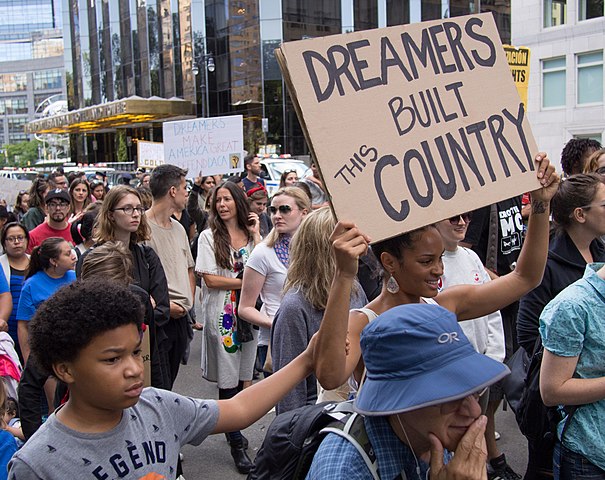World Demystified
Revoking DACA
Protesting against the revocation of DACA, numerous American citizens gather to make their opinion on the issue known. Many people are against taking away DACA due to the potential of deporting many illegal immigrants.
October 9, 2017
DACA- the four letter acronym that incites anger, confusion, and fear. This hot topic has been making its rounds throughout the news for a while due to the potential consequences that revoking DACA could cause. However, to fully understand what is going on with this issue, we must look deeper.
DACA, an executive order made by former President Barack Obama, stands for Deferred Action for Childhood Arrivals. It was initiated June 15, 2012, and it protected illegal immigrants from deportation. Additionally, those who were protected under DACA acquired work visas. The recipients must renew their DACA status every two years to retain their DACA rights. To acquire these rights, they must be either currently studying in the United States, have graduated from high school or the equivalent, honorably discharged from the military, or graduated from a technical or trade school. Whoever strives to get this status must meet the following criteria by June 15, 2012: must be under the age of 31, have come to United States before they were 16, and been physically in America on the date and when they applied for DACA. Also, the potential recipient had to have lived continuously in the United States from June 15, 2007, and must have never been convicted of a felony or certain misdemeanors, or three or more misdemeanors of any kind. For DACA members whose status will expire between September 5, 2017, and March 5, 2018, the deadline for reapplying for a DACA renewal was October 5, 2017.
President Donald Trump is revoking DACA due to its unconstitutional creation. Both the Department of Justice and President Trump agree that former President Obama’s action of creating this executive order was in direct conflict with the separation of powers and several pre-existing immigration laws. There is also a union of ten state generals attorney who agree that DACA being passed by a president is not within the bounds of checks and balances. These lawyers threatened to sue and bring the Trump administration to court if President Trump did not revoke the action. They argued that if President Trump did not rescind DACA, then he would be as much at fault as former President Obama. Only Congress should be able to pass such an action, and that is why Trump is allowing DACA to take six months, starting September 5, 2017, and ending March 5, 2018, to wind down. Therefore, creating enough time for Congress to create an actual law like DACA. Currently, Congress is working on several different acts to create into immigration laws for “alien” practice, such as the American Hope Act, the Recognizing American’s Children Act, and the Dreams Act.
If Congress does not pass a law before March 5, 2018, when DACA officially ends, then the United States will deport an estimated 800,000 people. Sophomore Hannah Stroup stated, “I know some people think it has merits, but for others it’s a life threatening situation.” Revoking DACA might not be the most moral decision, yet if all goes according to plan, then illegal immigrants under DACA status will be able to remain in the United States, under an actual law.












